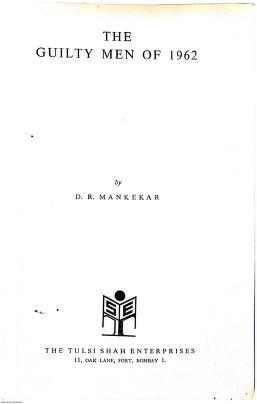The Guilty Men of 1962

About
Summary
Exquisite
TOC
Details
Related
URL
Images
Overview
The Guilty Men of 1962 by D.R. Manekar, published in 1968, is a critical examination of the circumstances surrounding India's defeat in the Sino-Indian War of 1962. The book serves as a scathing indictment of the political and military leadership at the time, particularly targeting key figures such as Prime Minister Jawaharlal Nehru and Defence Minister Krishna Menon. Through meticulous analysis and firsthand accounts, Manekar seeks to unravel the failures that led to India's military debacle against China.The narrative begins with an exploration of the geopolitical context leading up to the war, highlighting the historical tensions between India and China over border disputes. Manekar provides a detailed account of the events that transpired during the conflict, emphasizing the lack of preparedness and strategic foresight on the part of Indian leadership.
Manekar's approach combines personal anecdotes, interviews, and official documents to paint a comprehensive picture of the political climate in India during this tumultuous period. He critiques the decisions made by Nehru and Menon, arguing that their miscalculations and overconfidence contributed significantly to India's defeat. The book is not merely a historical account; it is also a call for accountability among those in power.
Importance of Book
Historical Insight: It provides valuable insights into a pivotal moment in Indian history, offering perspectives that challenge official narratives.
Critical Analysis: The book serves as a critical analysis of leadership during crises, making it relevant for contemporary discussions on governance and accountability.
Educational Resource: It is an essential resource for scholars, students, and anyone interested in understanding India's military history and foreign policy.
Key Themes
Leadership Failure: A dominant theme in The Guilty Men of 1962 is the failure of leadership at various levels. Manekar argues that Nehru's idealistic vision for India clashed with the harsh realities of international politics, leading to disastrous consequences.
Political Interference in Military Affairs: The book highlights how political considerations often overshadowed military strategy. Manekar criticizes Menon's interference in military operations, which he believes compromised India's defense readiness.
National Security and Preparedness: Manekar emphasizes the importance of national security and military preparedness, arguing that complacency and neglect in these areas left India vulnerable to external threats.
Historical Context: The author places the 1962 war within a broader historical context, examining colonial legacies and post-independence aspirations that shaped India's foreign policy.
Accountability: A significant aspect of Manekar's narrative is his call for accountability among leaders who failed to protect national interests. He stresses that understanding past mistakes is crucial for preventing future failures.
Cultural Significance
The cultural significance of "The Guilty Men of 1962" lies in its exploration of national identity and security within the context of post-colonial India. Manekar's critique resonates with readers who seek to understand how historical events have shaped contemporary Indian society. The book reflects broader themes of resilience and adaptation in response to external challenges.
Effects on Society
Awareness of Military Issues: The book raised awareness about military preparedness and strategic planning among policymakers and citizens alike.
Critique of Leadership: It sparked discussions about accountability among political leaders regarding national security decisions, prompting calls for reforms in defense policy.
Influence on Military Discourse: The memoir has influenced subsequent generations of military leaders by providing insights into effective leadership practices during crises.
Conclusion
The Guilty Men of 1962 by D.R. Manekar is a compelling examination of one of India's most challenging military conflicts. Through his candid reflections on leadership failures, political interference, and national security issues, Manekar provides valuable lessons that continue to resonate today.
As readers engage with this work, they are invited to reflect not only on historical events but also on contemporary issues related to national security and governance. The book serves as both a historical document and a critical narrative that enriches our understanding of India's military history while contributing to ongoing discussions about leadership in times of crisis.
Overall, The Guilty Men of 1962 stands as an essential contribution to literature on military history in India, offering insights that are both timely and timeless for anyone interested in understanding the complexities of defense policy and national security in a rapidly changing world.
Table of Content
\"The Guilty Men of 1962\" by D.R. Manekar, but I can give you an overview of the topics and themes typically covered in the book.Overview of Sections:
Background of the 1962 War: An introduction to the political and military context leading up to the Sino-Indian War.Political Decisions: Analysis of the decisions made by Indian political leaders and military commanders before and during the conflict.Military Strategy: Examination of India\'s military strategy and preparedness in the face of the Chinese invasion.Failures and Accountability: Discussion of the failures in planning and execution, with an emphasis on accountability for the outcomes.Consequences and Lessons Learned: Reflection on the aftermath of the war and the implications for Indian defense policy.
Title
The Guilty Men of 1962
Author
D R Manekar
Name of Publisher
The Tulsi Shah Enterprises Bombay
Publish Date
1968
Subject
It is a critical analysis of the circumstances surrounding the Sino-Indian War of 1962
Vintage
1948-2000
Edition
First
Category
History
Sub Category
Military
Rarity
RARE
